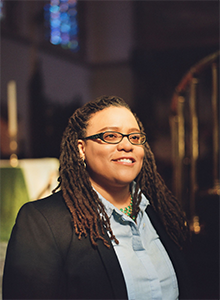Oxford College held a virtual celebration of Dr. Martin Luther King Jr. on Jan. 18 as part of the annual Emory King Week.
This year’s event featured keynote speaker Rev. Kim Jackson (09T), who represents Georgia State Senate District 41 and has worked towards social justice for decades.
Participants and attendees were welcomed by Rev. Dr. Lyn Pace, the chaplain of Oxford College who coordinated the event, as well as Hannah Bodus (22Ox), the 2020 MLK scholar from Covington, Georgia.
 Photo Courtesy of Emory University
Photo Courtesy of Emory University
The MLK scholarship was instituted in 1969 to honor King’s legacy of non-violence and social justice. The scholarship provides full tuition and accommodation for accepted students who “demonstrate outstanding character” through community service, academic achievements and leadership. The Emory College MLK scholarship is awarded to graduates of the Atlanta Public Schools system, while the Oxford College MLK scholarship is awarded to Newton County residents.
“Oxford College has hosted this MLK day celebration for more than three decades now. We're glad to welcome students, faculty, staff of Oxford College, other members of the Emory community and members of the local community and beyond,” Bodus said.
Bodus remarked that the MLK scholarship has given her significant opportunities.
“I can say this award is life changing for the best, by allowing underrepresented backgrounds like myself equal opportunities to pursue higher education nonetheless at a prestigious institute,” Bodus said. “Truly a Dr. King dream.”
Bodus further stated that “honoring Dr. King and taking time to remember his life work is the least we can do to say thank you for his courageous leadership to peacefully organize and enact social change to better the lives of the underserved and mistreated African American community here in the United States.”
After Bodus’ opening words, Maury Allums, the director of music at the Office of Spiritual and Religious Life, performed a song before Jackson began her speech.
She opened her speech by explaining how the lack of recognition of MLK Day has initiated her dedication to social justice and service.
At the age of 17, Jackson enrolled in Furman University (S.C.), where many members of the county “outright refused to make King Day a holiday.”
“I had no idea that there was a multi-decade struggle occurring in Greenville County about Martin Luther King Day,” Jackson said. “But it was one classroom assignment that has ultimately forever changed my life.”
Jackson was assigned to shadow Rev. Caesar Richburg in downtown Greenville who was actively involved in the community’s movement towards making MLK Day an official holiday.
“I saw firsthand what it looks like for a pastor to engage politically in social justice,” Jackson said. “I learned what it means to bring theology to the public square and I understood for the first time the importance of citizen engagement with local officials.”
Jackson said that under the mentorship of Richburg, along with her work in advocacy of the recognition of MLK Day, “something inside of me was unlocked. This thirst for justice and hunger for community organizing compelled me to … stand up for righteousness and to stand up for justice.”
Although she knew little about the specifics of her work when she started, Jackson noted that she was certain she had a responsibility to do something for peace and justice.
“So my question for you all today is what part do you play?” Jackson asked. “What part will you play as we all work to bend the long arc of the moral universe towards justice?”
Concluding her speech, Jackson reminded attendees that King “dreamed of a world house of peace” and that she believes his dreams still “serve as a blueprint for what kind of world we can build together.”
“I don’t know what your role will be, but I do know for sure that … if we are to honor the legacy, the hopes and the dreams of Dr. King, then we have to do something,” Jackson said. “So I invite you to find a way to play your small part in our collective work. Dear friends, as you go forth, be willing to follow in King’s steps by standing up for righteousness. Stand up for justice, and stand up for peace.”
Remarks from Dean of Oxford College Douglas Hicks closed the MLK celebration.
“It struck me … that Dr. King was not allowed to go to college Emory — Oxford or the Atlanta campus — and that’s a part of history that we must remember,” Hicks said.
Hicks added that along with celebrating King, Oxford College’s history of racism and segregation should also be acknowledged as part of the University’s story, and that we must “tell each other and understand what difference that makes for where we are now and where we’re going.”
“The Oxford campus where Emory was begun was constructed largely by labor of enslaved persons, early professors and presidents and trustees of Emory owned enslaved persons, and that is a fundamental part of our story,” Hicks said.
Hicks advocated for all at Oxford to assist the Twin Memorial Working Group that is currently working towards building memorials on both the Atlanta and Oxford campuses which will honor the labor of enslaved individuals who built the University campus.
He concluded the event by emphasizing Jackson’s inspiration for justice from her mentor, Richburg, and motivating students to actively search for mentorship as they strive towards social justice.
“I would also encourage you students to reach out to mentors … who have also worked to understand our efforts, our callings as part of that work for a more beloved community and a more just campus and a more just society.”





